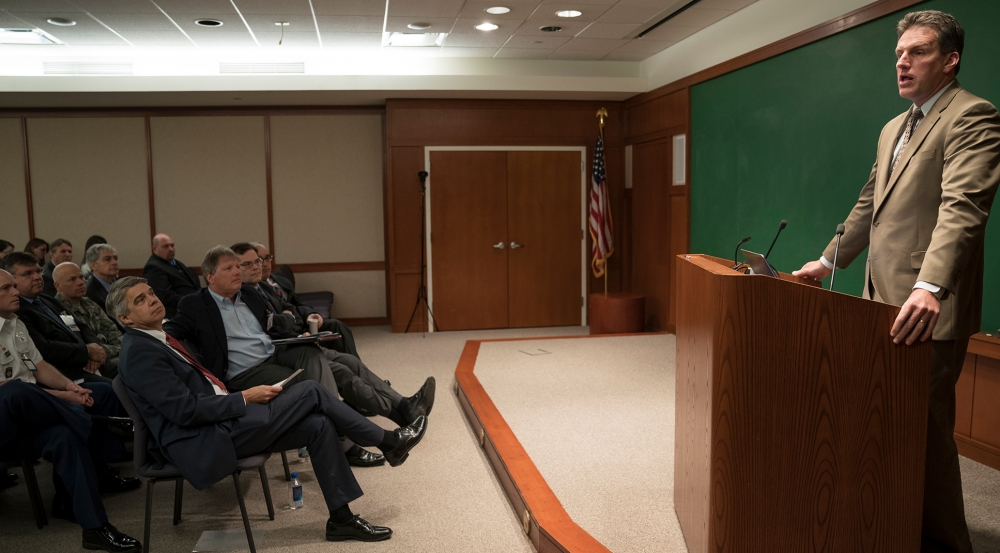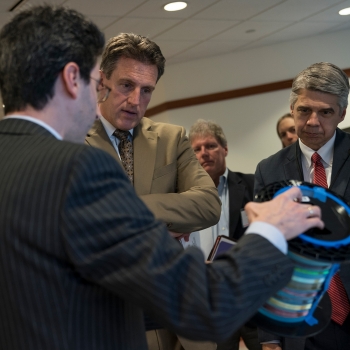
State grant will support advanced fiber and fabric research at Lincoln Laboratory
On 20 December, Secretary Jay Ash of the Massachusetts Executive Office of Housing and Economic Development announced a $3.9 million state grant to support the Defense Fabric Discovery Center (DFDC) at MIT Lincoln Laboratory. The award will promote the center's mission of innovating advanced fibers and fabrics for defense applications.
"Massachusetts has a long history of supporting our armed forces with technological advancement," Ash said during an event at the Laboratory. "We lead in innovation, entrepreneurship, and research and development. This phase two award to the DFDC will help drive advanced fabrics for the defense industry. It builds on world-class partners who understand the unique requirements of defense. The applications will help keep the military safe. That Massachusetts innovates in such a way is a reason to cheer this holiday season."

This award follows a $2.2 million grant announced by Massachusetts Lieutenant Governor Karyn Polito in May 2017 that helped launch the fall opening of the DFDC, which was established in collaboration with the U.S. Army Natick Soldier Systems Center (NSSC) and the Advanced Functional Fabrics of America (AFFOA). This latest state grant will enable an expansion of the DFDC facility and its state-of-the-art equipment. This equipment includes CAD tools, fiber draw towers, prototyping equipment, and systems integration capabilities.
"We have ideas for fabrics that are embedded with small antennas for short-range communications, that can sense changes in the environment, or that can store or produce energy. We are not idea limited," said Eric Evans, director of Lincoln Laboratory. "This new investment creates a way for the lab to stay on the edge of what's possible."
"What these technologies can do is empower, unburden, and protect our warfighters," said Matthew Correa, chief of the Design, Test and Analysis Branch at the U.S. Natick Research, Development, and Engineering Center. "The state of Massachusetts took this opportunity to seam these communities together to put these technologies on the back of our warfighters and eventually for industry utilizations."
The grant is part of the Massachusetts Manufacturing Innovation Initiative (M2I2) launched by the Baker-Polito Administration in 2016 to help Massachusetts manufacturers adopt innovative new technologies. Several grants have been awarded this year, including a $1.9 million grant in October to the Laboratory for the acquisition of a germanium deposition reactor. The administration has committed more than $100 million in funding over five years to support M2I2 projects across the Commonwealth.
The M2I2 was also established to facilitate state investment in the federal Manufacturing USA program, a network of research institutes that focus on advancing innovation in manufacturing and stimulating job growth through public-private partnerships. One such Manufacturing USA institute is AFFOA, which was funded in part by the Department of Defense under the Manufacturing Technology Program.
AFFOA has established several fabric discovery centers in addition to the DFDC in its mission to revolutionize the fabric industry. The state has pledged $40 million in M2I2 grants to these AFFOA-affiliated centers in its objective to be at the forefront of this textile revolution.
"The $40 million pledge to AFFOA has already been transformative to establishing fabric discovery centers, each with a specific area of expertise. Centers like the DFDC will develop advanced fabrics but will also make rapid prototyping accessible to local businesses and help local economic development. This is an exciting time for Massachusetts and the fabric industry," said Aimee Rose, chief technology officer of AFFOA.
"The DFDC is an important resource for our national security," said Stephen Luckowski, Department of Defense program manager of AFFOA. "But there are also many commercial applications that will emanate from this. I'm happy to be back here to further enhance the capability at the DFDC. The team at Lincoln Laboratory has done a fantastic job of bringing these partnerships together. I can't wait to see where they bring us in the new year."
